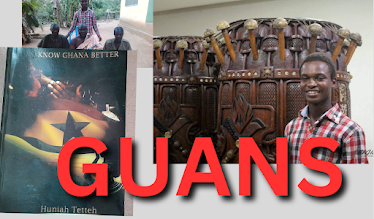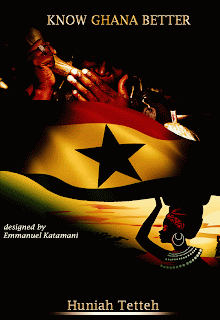ABOUT THE BOOK KNOW GHANA BETTER WRITTEN BY HUNIAH TETTEH
HOW THE BOOK CAME
ABOUT
The 2007 edition of
the Flamingo social studies book inspired me a lot to come up with this book. I
was then in J.H.S 1 when we were being taught the history of our beloved country
Ghana; I felt the history was not complete so I decided to investigate more into
the stories I had read from the book. When I began the research work, a whole
lot became clearer hence, making the production of this book possible. It took
a lot of time, dedication and research to produce this book to be accurate
enough and for the information within to be authentic.
I had to dedicate
most of my time interacting with people in order to gain more information for
the book. Though it looks complete now, there are still other parts of Ghanaian
history that need to be documented and I earnestly seek to achieve the task
quickly. Nevertheless, it was with the help of God that all this was possible.
You can e-mail me on knowghanabetter@gmail.com for
contributions or corrections. You can also follow me on Youtube i.e Huniah on Youtube or
knowghanabetter.blogspot.com
Then again, most Ghanaian tribal
histories are orally transmitted from generation to generation. That is to say
that they have not been fully documented and this is causing our heritage,
culture and rich history to be lost and corrupted over time. A fraction of our
youth are embracing and studying the history of the whites and abandoning ours.
As they embrace the culture of the whites; more harm than good is being caused
and thus, the inspiration to go in-depth and seek more knowledge about the
Ghanaian tribes and languages which eventually revealed a lot of things to me.
The research began in the year 2007 when I was in J.H.S 1 and even though the
book has been consequently published, more work needs to be done thus, in
subsequent volumes, there will be subsequent additions.
Certain elements are
worth knowing from this book and those words are boldly highlighted and serious notice or emphasis should be
stressed on these. The book is history based with comprehensible grammar so
that the reader could enjoy the histories. This book is not limited to just
higher level of African Heritage Studies but to all and sundry.
The histories covered
within the book are principally from oral sources so the author is not in any
way siding with certain tribes against the other. The histories in the book
have been carefully analysed over 12years period so the oral histories covered
are in the positive sense meant to portray our histories without favour or
prejudice. Where written documents are referred to, citations could be found at
the end of the book with the usual topic LIST
OF REFERRENCES. It would be good to note that this book is over 92% purely
oral sources.
Then again the
histories of all the tribes documented in this book are interwoven such that
should you read the history of let us say the
Guans, it would not just end there. You could further go on to find more
information on the Guans when you
read about the Ga-Dangmes or perhaps the Akans. Therefore, in conclusion, you
cannot read the history of just a tribe and conclude you know their history because
another part of their history continues with a different tribe.
Before you begin
reading this book, I would want you to know that although the history covered
are basically Ghanaian; some African facts are also covered. As you continue to
read the book, words that you may not be familiar with bear an asterisk (*),
and the definitions for these words can be found in the WORD POOL. Most of the definitions are virtually based on linguistics
and the definitions are very simple to understand. The book also offers basic words of courtesy, numerical and pronominal
system in some selected languages
and dialects for the language lovers
and to also clarify points and facts for the reader.







Comments
Post a Comment
Thank you! Gladly appreciate your feedback. You can also reach out personally via whatsapp or follow me on youtube/facebook Huniah Tetteh.